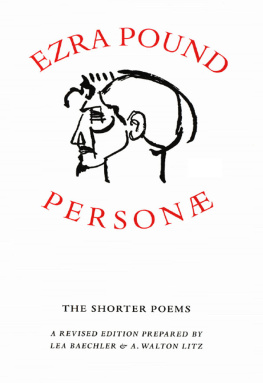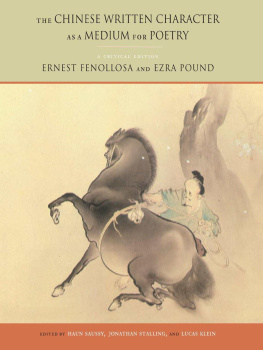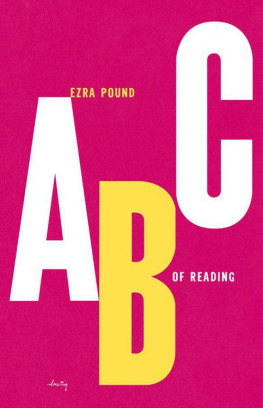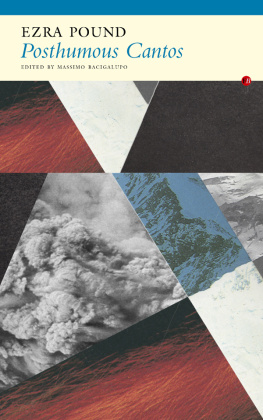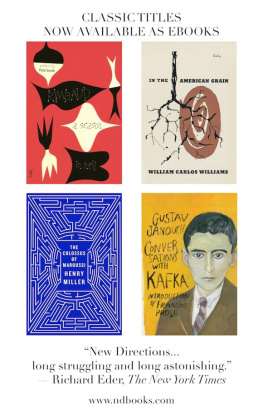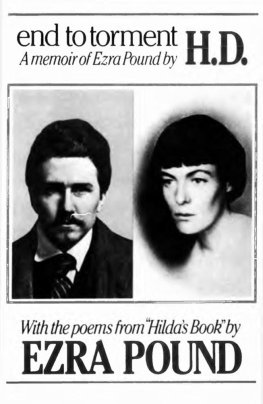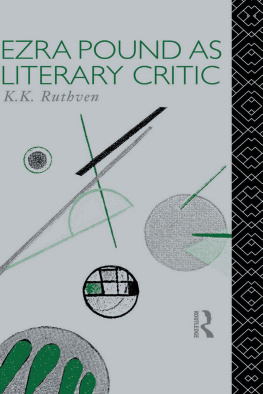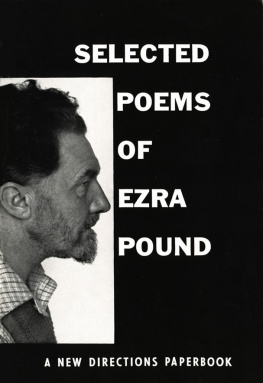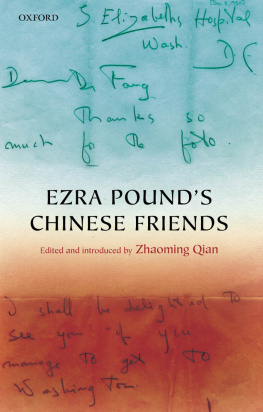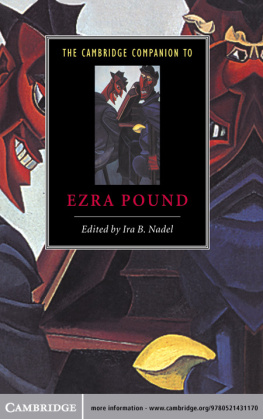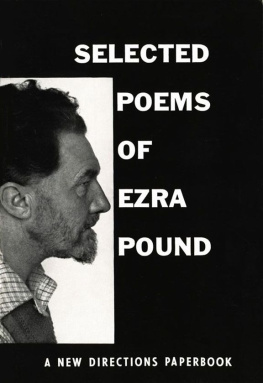POEMS OF
1908-1911
THE TREE
I stood still and was a tree amid the wood,
Knowing the truth of things unseen before;
Of Daphne and the laurel bow
And that god-feasting couple old
That grew elm-oak amid the wold.
Twas not until the gods had been
Kindly entreated, and been brought within
Unto the hearth of their hearts home
That they might do this wonder thing;
Nathless I have been a tree amid the wood
And many a new thing understood
That was rank folly to my head before.
THRENOS
No more for us the little sighing.
No more the winds at twilight trouble us. Lo the fair dead! No more do I burn. No more for us the fluttering of wings That whirred in the air above us. Lo the fair dead! No more desire flayeth me,
No more for us the trembling
At the meeting of hands. Lo the fair dead! No more for us the wine of the lips,
No more for us the knowledge.
Lo the fair dead! No more the torrent, No more for us the meeting-place (Lo the fair dead!) Tintagoel.
LA FRAISNE
For I was a gaunt, grave councillor
Being in all things wise, and very old,
But I have put aside this folly and the cold
That old age weareth for a cloak. I was quite strongat least they said so
The young men at the sword-play;
But I have put aside this folly, being gay
In another fashion that more suiteth me. I have curled mid the boles of the ash wood,
I have hidden my face where the oak
Spread his leaves over me, and the yoke
Of the old ways of men have I cast aside. By the still pool of Mar-nan-otha Have I found me a bride That was a dog-wood tree some syne. She hath called me from mine old ways
She hath hushed my rancour of council,
Bidding me praise Naught but the wind that flutters in the leaves.
She hath drawn me from mine old ways, Till men say that I am mad; But I have seen the sorrow of men, and am glad, For I know that the wailing and bitterness are a folly. And I? I have put aside all folly and all grief. I wrapped my tears in an ellum leaf And left them under a stone And now men call me mad because I have thrown All folly from me, putting it aside To leave the old barren ways of men, Because my bride Is a pool of the wood, and Though all men say that I am mad It is only that I am glad, Very glad, for my bride hath toward me a great love
That is sweeter than the love of women
That plague and burn and drive one away. Aie-el! Tis true that I am gay Quite gay, for I have her alone here
And no man troubleth us. Once when I was among the young men And they said I was quite strong, among the young men. Once there was a woman but I forget she was I hope she will not come again.
I do not remember .. I think she hurt me once, but .. That was very long ago. I do not like to remember things any more. I like one little band of winds that blow
In the ash trees here:
For we are quite alone
Here mid the ash trees.
CINO
Italian Campagna 1309, the open road Bah! I have sung women in three cities,
But it is all the same;
And I will sing of the sun.
Lips, words, and you snare them, Dreams, words, and they are as jewels, Strange spells of old deity, Ravens, nights, allurement: And they are not; Having become the souls of song. Eyes, dreams, lips, and the night goes.
Being upon the road once more,
They are not. Forgetful in their towers of our tuneing
Once for Wind-runeing
They dream us-toward and
Sighing, say, Would Cino,
Passionate Cino, of the wrinkling eyes,
Gay Cino, of quick laughter, Cino, of the dare, the jibe,
Frail Cino, strongest of his tribe
That tramp old ways beneath the sun-light,
Would Cino of the Luth were here! Once, twice, a year
Vaguely thus word they: Cino? Oh, eh, Cino Polnesi The singer ist you mean? Ah yes, passed once our way, A saucy fellow, but (Oh they are all one these vagabonds), Peste! tis his own songs? Or some others that he sings? But you, My Lord, how with your city? But you My Lord, Gods pity!
And all I knew were out, My Lord, you
Were Lack-land Cino, een as I am,
O Sinistro. I have sung women in three cities.
But it is all one. I will sing of the sun.
eh? they mostly had grey eyes,
But it is all one, I will sing of the sun. Polio Phoibee, old tin pan, you
Glory to Zeus aegis-day,
Shield o steel-blue, th heaven oer us
Hath for boss thy lustre gay! Polio Phoibee, to our way-fare
Make thy laugh our wander-lied;
Bid thy fulgence bear away care.
Cloud and rain-tears pass they fleet! Seeking eer the new-laid rast-way To the gardens of the sun .......
I have sung women in three cities
But it is all one. I will sing of the white birds
In the blue waters of heaven,
The clouds that are spray to its sea.
NA AUDIART
Que be-m vols mal Note: Anyone who has read anything of the troubadours knows well the tale of Bertran of Born and My Lady Maent of Montagnac, and knows also the song he made when she would none of him, the song wherein he, seeking to find or make her equal, begs of each preeminent lady of Langue dOc some trait or some fair semblance: thus of Cembelins her esgart amoros to wit, her love-lit glance, of Aelis her speech free-running, of the Vicomtess of Chalais her throat and her two hands, at Roacoart of Anhes her hair golden as Iseults; and even in this fashion of Lady Audiart although she would that ill come unto him he sought and praised the lineaments of the torse. And all this to make Una dompna soiseubuda a borrowed lady or as the Italians translated it Una donna ideale. Though thou well dost wish me ill Audiart, Audiart, Where thy bodice laces start
As ivy fingers clutching through
Its crevices, Audiart, Audiart, Stately, tall and lovely tender
Who shall render Audiart, Audiart, Praises meet unto thy fashion?
Here a word kiss! Pass I on Unto Lady Miels-de-Ben,
Having praised thy girdles scope
How the stays ply back from it; I breathe no hope
That thou shouldst Nay no whit Bespeak thyself for anything.
Just a word in thy praise, girl,
Just for the swirl
Thy satins make upon the stair,
Cause never a flaw was there
Where thy torse and limbs are met
Though thou hate me, read it set
In rose and gold. Or when the minstrel, tale half told,
Shall burst to lilting at the phrase Audiart, Audiart Bertrans, master of his lays,
Bertrans of Aultaforte thy praise
Sets forth, and though thou hate me well,
Yea though thou wish me ill, Audiart, Audiart.
Thy loveliness is here writ till, Audiart, Oh, till thou come again.
And being bent and wrinkled, in a form
That hath no perfect limning, when the warm
Youth dew is cold
Upon thy hands, and thy old soul
Scorning a new, wryd casement,
Churlish at seemed misplacement, Finds the earth as bitter
As now seems it sweet,
Being so young and fair
As then only in dreams,
Being then young and wryd,
Broken of ancient pride,
Thou shalt then soften,
Knowing, I know not how,
Thou wert once she Audiart, Audiart For whose fairness one forgave Audiart, Audiart Que be-m vols mal.
I.e. In illumed manuscript. Reincarnate.
VILLONAUD FOR THIS YULE
Towards the Noel that morte saison
(Christ make the shepherds homage dear!) Then when the grey wolves everychone
Drink of the winds their chill small-beer
And lap o the snows foods gueredon
Then makyth my heart his yule-tide cheer
(Skoal! with the dregs if the clear be gone!)
Wining the ghosts of yester-year. Ask ye what ghosts I dream upon?
(What of the magians scented gear?) The ghosts of dead loves everyone
That make the stark winds reek with fear
Lest love return with the foison sun
And slay the memories that me cheer
(Such as I drink to mine fashion)
Wining the ghosts of yester-year. Where are the joys my heart had won?

